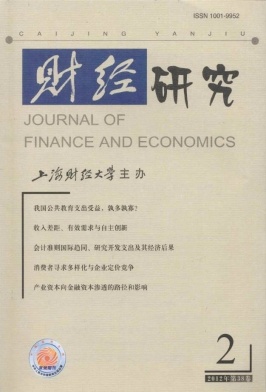从企业投资效率看盈余管理的经济后果——来自中国上市公司的经验证据
财经研究 2012 年 第 38 卷第 02 期, 页码:62 - 71
摘要
参考文献
摘要
文章以2005-2009年沪深两市上市公司为样本,从投资效率的角度检验了中国现实制度背景下盈余管理的经济后果。研究发现,企业盈余管理程度与未来投资效率显著负相关,上市公司盈余管理程度越高,其未来投资效率越低。文章由此得出结论:盈余管理不仅可能误导外部投资者的判断和决策,也对企业的内部决策产生了不利影响,损害了市场资源的有效配置,因此必须采取措施抑制企业的盈余管理行为。
[1]李明辉.股权结构、公司治理对股权代理成本的影响——基于中国上市公司2001~2006年数据的研究[J].金融研究,2009,(2):149-168.
[2]李维安,王新汉,王威.盈余管理对审计意见的影响[J].财经论丛,2005,(1):78-85.
[3]孙铮,王跃堂.资源配置与盈余操纵之实证研究[J].财经研究,1999,(4):4-9.
[4]王克敏,廉鹏,向阳.上市公司“出身”与盈余质量研究[J].中国会计评论,2009,(3):3-28.
[5]王跃堂,王亮亮,贡彩萍.所得税改革、盈余管理及其经济后果[J].经济研究,2009,(3):86-98.
[6]Beneish M D.Detecting GAAP violation:Implications for assessing earnings manage-ment among firms with extreme financial performance[J].Journal of Accounting and Public Policy,1997,16:271-309.
[7]Biddle G,Hilary G,Verdi R S.How does financial reporting quality relate to investment efficiency?[J].Journal of Accounting and Economics,2009,48:112-131.
[8]Bushman R,Smith A.Financial accounting information and corporate governance[J].Journal of Accounting Economics,2001,32:237-333.
[9]Dechow P M,Skinner D.Earnings management:Reconciling the views of accounting ac-ademic,practitioners,and regulators[J].Accounting Horizons,2000,14:235-250.
[10]Dechow P M,Sloan R G,Sweeney A P.Causes and consequences of earnings manipu-lation:An analysis of firm subject to enforcement actions by the SEC[J].Contempora-ry Accounting Research,1996,13:1-36.
[11]Dechow P,Dichev I.The quality of accruals and earnings:The role of accrual estima-tion errors[J].The Accounting Review,2002,77:35-59.
[12]Dechow P,Sloan R,Sweeney A.Detecting earnings management[J].The Accounting Review,1995,70:193-225.
[13]Feroz E H,Park K J,Pastena V.The financial and market effects of the SEC’s ac-counting and auditing enforcement releases[J].Journal of Accounting Research,1991,29:107-142.
[14]Healy P M,Wahlen J M.A review of the earnings management literature and its im-plications for standard setting[J].Accounting Horizons,1999,13:365-384.
[15]Hovakimian G.The determinants of investment cash flow sensitivity[R].Working Pa-per,Fordham University,2006.
[16]Hubbard G.Capital-market imperfections and investment[J].Journal of Economic Lit-erature,1998,36:193-225.
[17]Jaffee D,Russell T.Imperfect information,uncertainty,and credit rationing[J].Quar-terly Journal of Economics,1976,90:651-666.
[18]Jensen M.Agency costs of free cash flow,corporate finance and takeovers[J].Ameri-can Economic Review,1986,76:323-329.
[19]Kedia S,Philippon P.The economics of fraudulent accounting[J].Review of Financial Studies,2009,22:2169-2199.
[20]Lang M,Lundholm R.Cross-sectional determinants of analysts rating of corporate dis-closure[J].Journal of Accounting Research,1993,31:246-271.
[21]McNichols M F,Stubben S R.Does earnings management affect firm’s investment de-cisions?[J].The Accounting Review,2008,83:1571-1603.
[22]Myers S,Majluf N.Corporate financing and investment decisions when firms have in-formation that investors do not have[J].Journal of Financial Economics,1984,13:187-221.
[23]Richardson S.Over-investment of free cash flow[J].Review of Accounting Studies,2006,11:159-189.
[24]Sweeney A P.Debt-covenant violations and manager’s accounting responses[J].Jour-nal of Accounting and Economics,1994,17:281-308.
[25]Teoh S H,Welch I,Wong T J.Earnings management and the underperformance of seasoned equity offerings[J].Journal of Financial Economics,1998,50:63-99.
[26]Titman S,Wei K C J,Xie F.Capital investments and stock returns[J].Journal of Fi-nancial and Quantitative Analysis,2004,39:677-700.
[2]李维安,王新汉,王威.盈余管理对审计意见的影响[J].财经论丛,2005,(1):78-85.
[3]孙铮,王跃堂.资源配置与盈余操纵之实证研究[J].财经研究,1999,(4):4-9.
[4]王克敏,廉鹏,向阳.上市公司“出身”与盈余质量研究[J].中国会计评论,2009,(3):3-28.
[5]王跃堂,王亮亮,贡彩萍.所得税改革、盈余管理及其经济后果[J].经济研究,2009,(3):86-98.
[6]Beneish M D.Detecting GAAP violation:Implications for assessing earnings manage-ment among firms with extreme financial performance[J].Journal of Accounting and Public Policy,1997,16:271-309.
[7]Biddle G,Hilary G,Verdi R S.How does financial reporting quality relate to investment efficiency?[J].Journal of Accounting and Economics,2009,48:112-131.
[8]Bushman R,Smith A.Financial accounting information and corporate governance[J].Journal of Accounting Economics,2001,32:237-333.
[9]Dechow P M,Skinner D.Earnings management:Reconciling the views of accounting ac-ademic,practitioners,and regulators[J].Accounting Horizons,2000,14:235-250.
[10]Dechow P M,Sloan R G,Sweeney A P.Causes and consequences of earnings manipu-lation:An analysis of firm subject to enforcement actions by the SEC[J].Contempora-ry Accounting Research,1996,13:1-36.
[11]Dechow P,Dichev I.The quality of accruals and earnings:The role of accrual estima-tion errors[J].The Accounting Review,2002,77:35-59.
[12]Dechow P,Sloan R,Sweeney A.Detecting earnings management[J].The Accounting Review,1995,70:193-225.
[13]Feroz E H,Park K J,Pastena V.The financial and market effects of the SEC’s ac-counting and auditing enforcement releases[J].Journal of Accounting Research,1991,29:107-142.
[14]Healy P M,Wahlen J M.A review of the earnings management literature and its im-plications for standard setting[J].Accounting Horizons,1999,13:365-384.
[15]Hovakimian G.The determinants of investment cash flow sensitivity[R].Working Pa-per,Fordham University,2006.
[16]Hubbard G.Capital-market imperfections and investment[J].Journal of Economic Lit-erature,1998,36:193-225.
[17]Jaffee D,Russell T.Imperfect information,uncertainty,and credit rationing[J].Quar-terly Journal of Economics,1976,90:651-666.
[18]Jensen M.Agency costs of free cash flow,corporate finance and takeovers[J].Ameri-can Economic Review,1986,76:323-329.
[19]Kedia S,Philippon P.The economics of fraudulent accounting[J].Review of Financial Studies,2009,22:2169-2199.
[20]Lang M,Lundholm R.Cross-sectional determinants of analysts rating of corporate dis-closure[J].Journal of Accounting Research,1993,31:246-271.
[21]McNichols M F,Stubben S R.Does earnings management affect firm’s investment de-cisions?[J].The Accounting Review,2008,83:1571-1603.
[22]Myers S,Majluf N.Corporate financing and investment decisions when firms have in-formation that investors do not have[J].Journal of Financial Economics,1984,13:187-221.
[23]Richardson S.Over-investment of free cash flow[J].Review of Accounting Studies,2006,11:159-189.
[24]Sweeney A P.Debt-covenant violations and manager’s accounting responses[J].Jour-nal of Accounting and Economics,1994,17:281-308.
[25]Teoh S H,Welch I,Wong T J.Earnings management and the underperformance of seasoned equity offerings[J].Journal of Financial Economics,1998,50:63-99.
[26]Titman S,Wei K C J,Xie F.Capital investments and stock returns[J].Journal of Fi-nancial and Quantitative Analysis,2004,39:677-700.
引用本文
任春艳. 从企业投资效率看盈余管理的经济后果——来自中国上市公司的经验证据[J]. 财经研究, 2012, 38(2): 62–71.
导出参考文献,格式为:
下一篇:消费者寻求多样化与企业定价竞争





 7635
7635  4421
4421

